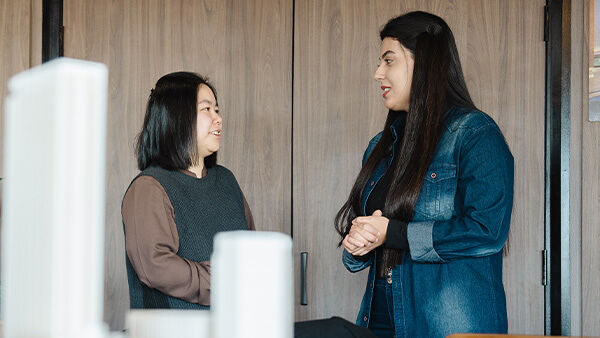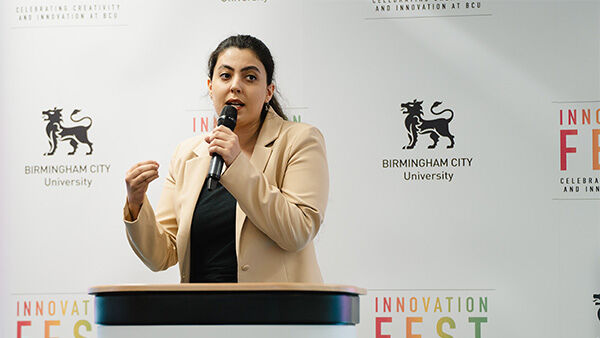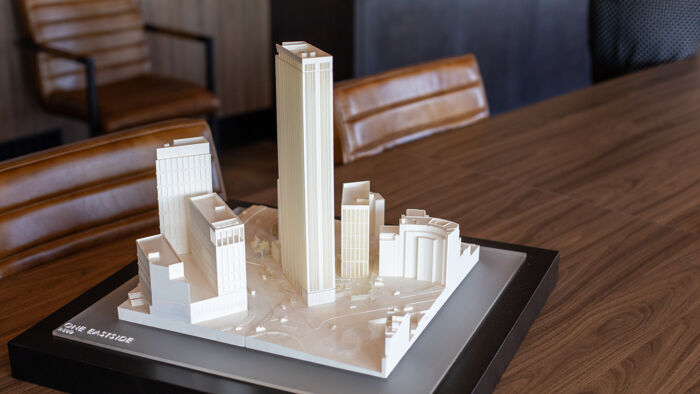Developing a digital twin
One Eastside
Buildings of the future
One Eastside is a residential skyscraper currently under construction, set to be the tallest building in Birmingham at 509ft tall. This BCU research project aims to develop a pilot digital twin platform tailored for Court Collaboration, designed for immediate operation at One Eastside with the potential for future scalability.
Central to this initiative is the deployment of Internet of Things (IoT) sensors to monitor an extensive range of indoor conditions, such as temperature, air quality, occupant behaviour, humidity, lighting, smoke, and gas leakage.
For more information on the research project, contact Saeed Talebi (saeed.talebi@bcu.ac.uk)
Key Impacts
Optimised energy consumption
Improved Indoor air quality
Balancing of air quality and energy consumption
Decreased Co2 Emissions
This foundational work facilitates the integration of real-time sensor data with a 3D BIM, which enables the creation of a dynamic digital twin. Through the development of a data dashboard and the application of artificial intelligence, the platform will not only visualise but also analyse and manage the environment based on the collected data.
This comprehensive approach aims to optimise the building's performance, enhance occupant comfort, and inform the design of future projects. By leveraging the latest advancements in IoT and AI, this project is poised to establish a new benchmark for sustainable and efficient building management.
The development will mark a significant leap forward in the application of digital twin technology in building management in the UK and internationally.
Working as a Research Assistant on the OneEastside Digital Twin
Paige Wenbin Tien describes her journey to working as a research assistant on the OneEastside Digital Twin project here.

Meet PhD researcher Negin Kosh Amadi
Negin is currently working alongside experts here in the Built Environment to create the OneEastside digital twin on her PhD programme. Discover her story here.

Benefits of the Digital Twin to One Eastside Project
-
1.
Advanced real-time monitoring optimises air quality and energy usage, which leads to reduced operational costs and a healthier environment for occupants, thus contributing to improved occupant comfort and reduced carbon emissions of OES and future projects.
-
2.
Predictive maintenance enhances HVAC efficiency, which results in significant energy savings, prolonged asset life, and minimised energy waste, while also supporting the proactive optimisation of building performance by facility management through actionable data analytics.
-
3.
The pilot digital twin serves as a collaborative platform, which fosters strategic decision-making for energy conservation and emission reduction, and enabling remote collaboration among stakeholders, which reduces travel needs and streamlines asset management.
-
4.
Real-time insights allow for timely adjustments, enhancing health, safety, and compliance through continuous monitoring of air quality, temperature, humidity, and occupancy levels among other parameters, thereby ensuring continuous oversight and extending the lifespan of HVAC systems.
-
5.
Enhances marketing and sales/rental efforts with realistic property visualisations, making it a valuable tool for showcasing properties to potential buyers/renters.
-
6.
Acts as a comprehensive repository for all building information, which enhances compliance documentation and streamlining maintenance, facilities management, and operational workflows.
-
7.
Anticipated outcomes include reduced energy consumption, enhanced health and well-being of occupants, and lower maintenance costs, with a user-friendly platform for monitoring and visualising indoor conditions that aids in informed decision-making and demonstrates the commercial potential for PIC and Court Collaboration in the software engineering market.
Built Environment Research
Built Environment is a major provider of professionally relevant courses for the property and construction industries and we are dedicated to the teaching of future professionals. Discover Built Environment Research at BCU.

Developers of Birmingham’s tallest skyscraper inspire and learn from next generation
A successful student mentorship scheme between Birmingham City University (BCU) and residential property developer Court Collaboration will be extended to a second year, following a successful pilot.


